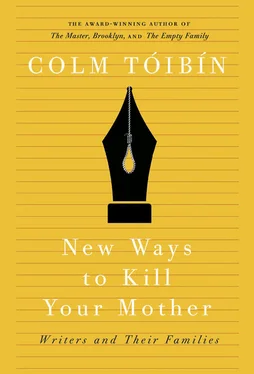By May, when Rose had been moved to an institution, Williams’s mother wrote to her parents once more: ‘Tom and I went out to see Rose Sunday… The visit made Tom ill so I can’t take him to see her again. I can’t have two of them there!’ In September that year, having seen Rose, Williams wrote: ‘No, I haven’t forgotten poor Rose — I beg whatever power there is to save her and spare her from suffering.’ The following year, he saw her again: ‘She is like a person half-asleep now — quiet, gentle and thank God — not in any way revolting like so many of the others — She sat with us in a bright sunny room full of flowers — said “yes” to all our questions — looked puzzled, searching for something — sometimes her eyes filled with tears — (So did mine).’
In August 1939 Rose’s medical report read: ‘Does no work. Manifests delusion of persecution. Smiles and laughs when telling of person plotting to kill her. Talk free and irrelevant. Admits auditory hallucinations. Quiet on the ward. Masturbates frequently. Also expresses various somatic delusions, all of which she explains on a sexual basis. Memory for remote past is nil. Appetite good. Well nourished.’
Four months later when Williams had made another visit, he wrote: ‘Visited Rose at sanitarium — horrible, horrible! Her talk was so obscene — she laughed and spoke continual obscenities — Mother insisted I go in, though I dreaded it and wanted to go out and stay outside. We talked to the Doctor afterwards — a cold, unsympathetic young man — he said her condition was so hopeless that we could only expect a progressive deterioration.’
In March 1943, when Rose had a lobotomy, Williams wrote: ‘A cord breaking. 1000 miles away. Rose. Her head cut open. A knife thrust in her brain. Me. Here. Smoking. My father, mean as a devil, snoring 1000 miles away.’
Rose came to him in dreams in which his identity and hers seemed confused. In December 1948, while crossing the Atlantic, he noted:
Later I dreamed of my sister. Woke up. Then went to sleep and dreamed of her again. At one point I was lying in her bed, the ivory-colored bed: but it was not a dream of incest, although I am at a loss to explain it. I was standing naked in a room. Heard footsteps. Jumped in the bed to cover myself. Discovered it was my sister’s bed. She entered the room. Spoke to me angrily and pulled back the covers. I struggled not to expose my nakedness. She turned away crossly while I got hastily up from the bed. There I woke up.
Four years later in Spain he noted another dream: ‘I’ve dreamed of my sister, seeing her in a cream colored lace dress which I had forgotten. In the dream a lady who looked like my sister wore it — then I had it on and then I was struggling to sit down between two tables and was wedged so tightly between them I couldn’t breathe.’
In later years he saw more of his sister, writing in 1979 in Key West:
My sister Rose, the living presence of truth and faith in my life. If I go abroad to die, I must not leave her, afterwards, in the custody of her present companion, a tasteless woman whose idea of giving Rose a good time is to take her to the Masonic Lodge… Tonight she had dressed Rose for a party at Kate’s in a livid green dress from Woolco’s, as tasteless as possible and as unbecoming. I had said that Rose should have a green dress but I meant to buy it for her myself, in a pastel shade, such as lettuce.
Part of the reason for Williams’s obsession with his sister was his feeling that he, too, could easily have followed her into a mental institution. ‘The shadow of what happened to Rose’ haunted him in the years of his success and in subsequent years when the plays he wrote did not find large audiences or win much praise and he was addicted to various drugs and to alcohol. As early as his visit to her in 1939 he saw the danger for himself, as his mother had two years earlier. He wrote: ‘It was a horrible ordeal. Especially since I fear that end for myself.’ The artist Vassilis Voglis, a friend of Williams’s, told his biographer Donald Spoto: ‘He was devoted to Rose, but in a way she was an extension of himself. He could have had the lobotomy. He felt the outsider, marred in some way. He really cared for her, and perhaps he never really cared for anyone else in his life, ever. And I think he knew it.’
In 1973, speaking of his play Out Cry , he said:
I’ve had a great deal of experience with madness; I have been locked up. My sister was institutionalized for most of her adult life. Both my sister and I need a lot of taking care of… I’m a lonely person, lonelier than most people. I have a touch of schizophrenia in me and in order to avoid madness I have to work.
In his notebooks for 1957, Williams noted that he was ‘stealing a week between New York and the “retreat”… at Stockbridge, assuming I do go there’. He wrote to his mother:
I stayed only five minutes in the Institute. I took one look at the other patients and told Frank to carry my bags right back out to the car. I checked into the local hotel and stayed there over the weekend to make sure that this was not the place for me, then drove back to New York. I think the psychiatrist Dr Kubie who is head of the analytic institute in New York, is right in thinking I need some therapy of that kind to relieve the tensions that I have been living under, but I think it’s unnecessary for me to live in a house full of characters that appeared to be more disturbed than myself.
The following year, he wrote to Elia Kazan:
I had to defy my analyst to continue my work this past year. He said I was over-worked and must quit and ‘lie fallow’ as he put it, for a year or so, and then resume work in what he declared would be a great new tide of creative power, which he apparently thought would come out of my analysis with him. I wanted to accept this instruction but without my work, I was unbearably lonely, my life unbearably empty.
In 1969, a period not covered in the notebooks, Williams was confined to a mental hospital in Saint Louis by his brother where he stayed for three dreadful months.
Williams managed in his best work to harness that shadow of madness that lay over him and that fell on his sister. He made it appear almost normal, an unsettled striving within the soul, a brave dreaming up of the more wondrous parts of the self. He made its roots seem common to us all. But then, as he must have seen it develop in Rose, he dramatized its growth into a sort of poisonous power that slowly overcame and undid his characters.
It is remarkable in the notebooks how little credit he gave himself for his own genius at handling and shaping this material, his skills at catching patterns of speech and building dramatic structure, his astonishing sympathy for powerless dreamers especially when they came dressed up and ready to kill or were full of hidden erotic hope. As his own power waned, he did not, as other dramatists did, spend time overseeing new productions of old work. It was part of his unresolved innocence, his own nature as a dreamer, that he went on writing, despite the fact that most of his work after The Night of the Iguana in 1961 seemed to fail; it had been a great struggle to start, and now, as the last miserable pages of his notebooks make clear, it was too much of a struggle to stop. He knew that the creation of his characters was what had justified his life. As he came close to the end he wrote: ‘Did I die by my own hand or was I destroyed slowly and brutally by a conspiratorial group? There is probably no clear cut answer… Perhaps I was never meant to exist at all, but if I hadn’t, a number of my created beings would have been denied their passionate existence.’
John Cheever: New Ways to Make Your Family’s Life a Misery
Читать дальше












